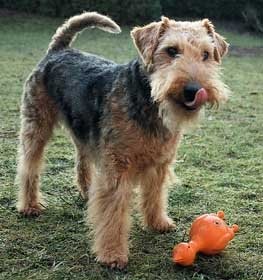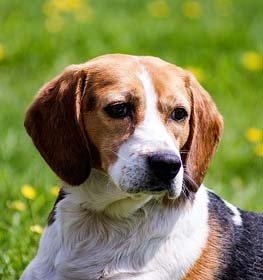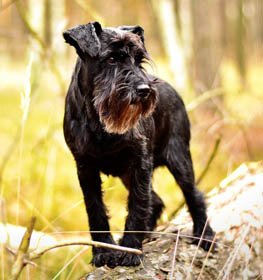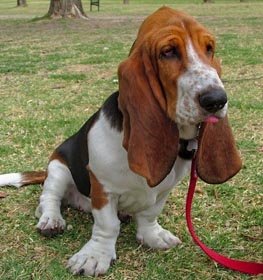Welsh Terrier Information & Dog Breed Facts
Collection of all the general dog breed info about Welsh Terrier so you can get to know the breed more.
| Group | Hunting Dogs |
|---|---|
| Popularity Rank | 109 |
| Reviews | 2 |
| User Ratings | |
|
Compare the Welsh Terrier With Other Dogs
Select at least one dog breed to make the comparsion. | |
 | |
| Origin | |
|
Common Names & Aliases
What other names is a Welsh Terrier known by? Discover all traditional, regional and informal names used for this breed. | Welshie |
|---|---|
|
Breed Classification
What type of dog breed is a Welsh Terrier? Learn about its genetic classification and breeding category. | Purebred |
|
Size Classification
What size category is a Welsh Terrier? Learn how big the Welsh Terrier breed typically grows. | Small |
|---|---|
|
Weight Statistics
How much does a Welsh Terrier weigh? Discover typical weight ranges for adult males and females of the Welsh Terrier breed. | Male: 18-23 pounds (8-10 kg), Female: 18-23 pounds (8-10 kg) |
|
Average Weight
What is the average weight of a Welsh Terrier? | Male: 20.5 pounds (9 kg), Female: 20.5 pounds (9 kg) |
|
Height
How tall is the Welsh Terrier? Welsh Terrier height: | Male: 14-16 inches (36-41 cm), Female: 13-15 inches (33-38 cm) |
|
Average Height
What is the average height of a Welsh Terrier? | Male: 15 inches (38.5 cm), Female: 14 inches (35.5 cm) |
|
Price Range
How much does a Welsh Terrier puppy cost? Find current market prices and factors affecting Welsh Terrier costs. | $800-$1200 If you choose to purchase the Welsh Terrier, you should know that the mentioned amount of money is an average of the collected data from breeders’ sites and puppy finder places. If you have a Welsh Terrier for sale, please advertise it on a reliable website to make sure the Welsh Terrier gets to a happy place. |
|---|---|
|
Availability
How easy is it to get a Welsh Terrier? How many Welsh Terrier are there in the world? | Frequent: The Welsh Terrier is easier than average to get. Maybe there is some risk of overbreeding, as it is a popular breed. Due to its popularity, inbreeding may occur. A new study shows that inbreeding contributes to the incidence of disease and health problems. So be careful and seek the help of an experienced person or a professional, in making your decision. |
|
Intelligence Rating
How intelligent is a Welsh Terrier? Discover the Welsh Terrier's intelligence ranking and learning capabilities. | Average: It takes patience to teach this breed any tricks or commands, but the effort is worth it. They understand and remember new commands after an average of 25-40 repetitions.
The Welsh Terrier ranks average in the intelligence ranking of dogs. |
|---|---|
|
Training Difficulty
How easy is it to train a Welsh Terrier? Learn about the Welsh Terrier's trainability and response to training methods. | Welsh Terrier dogs are easy to train. They find out the association between commands and actions quite quickly. |
|
Watchdog Rating
How good is a Welsh Terrier as a watchdog? Learn about the Welsh Terrier's alertness and guarding instincts. | Welsh Terrier dogs are average watchdogs. If they sense something different, they will alert you, but observation isn't considered their main job.
|
|
Territorial Protection
Is a Welsh Terrier protective of its territory? Learn about the Welsh Terrier's guarding instincts and behavior. | Welsh Terrier dogs are extremely protective guard dogs. This breed doesn't hesitate to protect its territory so the Welsh Terrier can be a good choice if you want an excellent guard dog. Keep calm and the Welsh Terrier will take care of unwanted people or animals. |
|
Personality Traits
What personality does a Welsh Terrier have? Learn about characteristic Welsh Terrier temperament and behavior traits. | LovingIndependentAlertIntelligentFriendlySpirited |
|---|---|
|
Sensitivity Level
How sensitive are they? Welsh Terrier sensitivity: | Welsh Terrier dogs have an average emotional level and are not the most sensitive dog breed. Sometimes it's okay to change the daily routine, have guests and listen to loud music.
Some dogs handle moderate punishment very well, while others crumble apart at a dirty look. This breed is not affected emotionally by moderate punishment. |
|
Affection Level
How affectionate are they? Is a Welsh Terrier a good family dog? | Average to High: Welsh Terrier dogs are highly affectionate dogs. They like being involved in the family's life. This breed isn't considered an aloof dog. |
|
Social Needs
How much social interaction does the Welshie need? Welsh Terrier social needs: | Welsh Terrier dogs need for social interaction is average. This breed likes being around people or other animals, but they don't mind being left alone for a few hours either. |
|
Impulse to Wander or Roam
How likely is the Welsh Terrier to run away? Does this breed explore or wander a lot? Does Welsh Terrier roam? | The wanderlust potential of the Welsh Terrier is strong enough to escape from home. They have a strong desire for exploring the world. Safer to walk them on a leash unless you teach them how to get back to you on command. |
|
Prey Drive
Do this canine have a strong prey drive? Does Welsh Terrier have high prey drive? | Welsh Terrier dogs have a high impulse to chase and catch something. Cats or any other small animals are in danger. It's a natural instinct, doesn't necessarily mean that Welsh Terrier dogs are aggressive. Better to keep this breed on a leash. |
|
Barking Frequency
Does a Welsh Terrier bark a lot? Learn about typical Welsh Terrier vocalization patterns and triggers. | A lot: Welsh Terrier is a particularly loud breed. They often enjoy barking and howling loudly. If you want a quiet dog, not the best choice.
The main triggers for barking are fear, attention, alarm, boredom, greeting, separation anxiety, compulsive barking, and defense. |
|---|---|
|
Playful Nature
How playful is a Welsh Terrier? Understand the typical play drive and energy level of the Welsh Terrier breed. | The Welsh Terrier is a playful breed. Excited barking and sometimes nipping will alert you to play. |
|
Apartment Adaptability
Can a Welsh Terrier live in an apartment? Learn about the Welsh Terrier's suitability for apartment living. | Apartment-friendly dog the Welsh Terrier breed. It is best if you have a small garden where it can occasionally go out to do its business, but this is not important at all. You can exercise him enough with a walk or two a day, so he's comfortable in an apartment. |
|
Lifestyle Adaptability
How adaptable is a Welsh Terrier to lifestyle changes? Learn about the Welsh Terrier's flexibility to new situations. | Welsh Terrier dogs adapt very well to lifestyle changes and basically all living environments. They don't mind moving from one place to another with their owner. |
|---|---|
|
Alone Time Tolerance
Can a Welsh Terrier be left alone? Learn about the Welsh Terrier's tolerance to solitude. | Just like every puppy, they are prone to panic, cry, bark, whine when they left alone by their owner. With proper socialization and quality time with the dog can solve this problem. |
|
Bite Risk Assessment
What is a Welsh Terrier biting potential? Learn about the Welsh Terrier's bite risk factors. | Low 🔽 The Welsh Terrier has a low chance of biting somebody. Top reasons for dog bite: protection, pain, excitement, herding instinct, being provoked. (Data based on the available online bite statistics.) |
|---|---|
|
Mouthing Tendency
Is a Welsh Terrier mouthy? Learn about the Welsh Terrier's tendency to use mouth during play. | Welsh Terrier dogs have a lower than average tendency to nip, chew, playbite, or herd people. It's a common habit during puppyhood, not aggressive behavior. These "bites" don't hurt, but Welsh Terrier dogs need to be taught a good attitude. |
|
Bite Strength Rating
How strong is a Welsh Terrier bite? Learn about the Welsh Terrier's bite force measured in PSI. | Between 100 and 200 PSI 🔽 Welsh Terrier bite force: Weak. The Welsh Terrier bite force is considered weak when compared to other dog breeds. The bite force Welsh Terrier measurements usually fall below 200 PSI, making them one of the breeds with the weakest bite force. The bite force of a Welsh Terrier may be weak, but it's important to remember that any dog's bite can still be dangerous if not managed properly. Despite the bite force of Welsh Terrier being lower, it does not make them any less lovable or enjoyable as pets.
Welsh Terrier bite wounds might not be as severe, but it is still essential to be cautious and prevent any biting incidents. They are usually not aggressive and very friendly towards children and other animals. To ensure a well-behaved dog, it's essential to learn how to train a Welsh Terrier puppy not to bite from an early age. With proper training and socialization, a Welsh Terrier can be a wonderful addition to any family, providing love and companionship for years to come. |
|
Average Lifespan
How long does a Welsh Terrier live? Learn about the typical lifespan of the Welsh Terrier breed. | 10-14 years The average lifespan of Welsh Terrier: 12 years |
|---|---|
|
Climate Tolerance
How well does a Welsh Terrier handle different weather? Learn about the Welsh Terrier's climate adaptability. | Prefers average to warm weather conditions Different dogs have different preferences when it comes to weather conditions. However, in general, most dogs prefer average to warm weather conditions, as they typically find hot weather conditions to be uncomfortable and taxing. |
|
Health Concerns
What health issues are common in a Welsh Terrier? Discover typical conditions affecting the Welsh Terrier breed. | Welsh Terriers tend to have more frequent health issues than other breeds. Regular vet check-ups are needed.
|
|
Vet Care Frequency
How often does a Welsh Terrier need vet visits? Learn about the Welsh Terrier's veterinary care requirements. | Frequent The Welsh Terrier should have a complete physical check-up at least once (but preferably twice) per year. If your dog shows any symptoms, call your veterinarian. |
|
Health Problems
What genetic/health problems does the Welsh Terrier breed have? What are the health issues and concerns of the Welsh Terrier breed? Most common health risks of Welsh Terrier: | Skin Irritation |
|
Energy Rating
How energetic is a Welsh Terrier? Understand daily activity needs of the Welsh Terrier breed. | Welsh Terrier dogs are high-energy dogs. An active lifestyle makes them happy. |
|---|---|
|
Activity Requirement / Exercise Need
How much exercise does a Welsh Terrier need? How much exercise do Welsh Terrier dogs require per day?
Do Welsh Terrier dogs need a lot of exercises? | Welsh Terrier dogs need quite a lot of exercise. Daily walks should be on schedule. If you live an active life, this breed can be a good choice for you. |
|
Sleeping Need
How much sleep does the Welsh Terrier breed need? | Welsh Terrier dogs don't need too much sleep. They are energetic and desire to live active life. If you think naps are overrated, this breed can be the best choice for you. |
|
Obesity Tendency
Is a Welsh Terrier prone to weight gain? Learn about the Welsh Terrier's obesity risks. | Average: The Welsh Terrier has an average risk for obesity. Daily walks should be on schedule. To make your dog happy and fit, feed him with quality dry dog food and live an active life together. Try to find the happy medium between exercise and feeding.
If you notice any weight gain, consult your veterinarian and make a diet plan. Reduce unhealthy food and snacks, and measure the Welsh Terrier weight regularly. |
|---|---|
|
Food Consumption
How much food does a Welsh Terrier need daily? Learn about the Welsh Terrier's feeding requirements. | 0.5 to 1.5 cups of high-quality dry food a day, divided into two meals. |
|
Allergy Friendliness
Is a Welsh Terrier hypoallergenic? Learn about the Welsh Terrier's suitability for allergy sufferers. | Yes Welsh Terrier dogs do well with allergy sufferers by causing fewer allergic reaction. However there are no 100% hypoallergenic dogs in the world, there are a variety of breeds that are considered to reduce or minimize the possibility of an allergic response. Coat type isn't necessarily relevant, because most people are allergic to dander (flakes on the dog's skin) or saliva, not actually to dog hair. |
|---|---|
|
Coat Colors
What colors does a Welsh Terrier come in? Discover all possible Welsh Terrier color variations. | BlackTanGrizzle |
|
Grooming Requirements
How much grooming does a Welsh Terrier need? Learn about Welsh Terrier coat maintenance requirements. | Advanced: The Welsh Terrier requires a lot of grooming. Cutting the dog's hair by a professional groomer can be helpful sometimes. Regular brushed dog's coat is less likely to shed. Ears and eyes should be cleaned often to avoid infections. Don't skip the seasonal flea treatment too. Occasional dog nail trimming and dog baths are important.Check the local pet store for dog grooming supplies and find the best dog shampoo to keep its coat healthy and to give your Welsh Terrier a pleasant experience of a dog bath. If you don't have the time, skill, or money to take care of your Welsh Terrier, search for the best dog groomer or clipping service in your area and book an appointment. Maybe you're lucky to have a dog boarding service that includes grooming or walk-in dog bath places nearby. |
|
Drooling Tendency
Does a Welsh Terrier drool a lot? Learn about the Welsh Terrier's drooling habits. | The Welsh Terrier is a perfect example of a very low drooling tendency. If you're disgusted by slobber spots on your clothes, the Welsh Terrier could be a perfect choice for you. Drooling is the unintentional saliva flowing outside of the mouth. It can be completely normal or a sign of a health problem. Certain dog breeds drool minimum compared to others, just like the Welsh Terrier.
If you notice any change in your dog's drooling habit, you should contact a vet as soon as possible. |
|
Stinkiness Rating
Does a Welsh Terrier smell bad? Learn about the Welsh Terrier's natural odor levels. | Medium ⏺ The Welsh Terrier has an average chance of bad smell. Top reasons for dog stinkiness: infection of bad tooth/ear/skin folds, gas attacks. |
|
Coat Characteristics
What type of coat does a Welsh Terrier have? Learn about the Welsh Terrier's fur characteristics. | WirySoftWaterproof |
|
Bathing Needs
How often does a Welsh Terrier need baths? Learn about the Welsh Terrier's bathing requirements. | 3-4 weeks More often than average. These dog coats tend to be longer, softer, and oilier than short-haired breeds. While a good bath every now and then is a great way to keep your buddy from becoming overly smelly, be mindful about overbathing.
Bathing will wash away your dog’s natural oils, while a simple brushing every few days should keep them clean. |
|
Shedding Level
How much do Welsh Terrier dogs shed? How to control, reduce and prevent the shedding of the Welshie? Do Welsh Terrier dogs shed a lot? | Welsh Terrier dogs shed none to minimal. Having a puppy from this breed you don't have to be afraid of your couch or car being covered by dog hair. Welsh Terrier dogs could be the best choice if you don't tolerate dog hair. |
|
Child Compatibility
Is a Welsh Terrier good with children? Learn about the Welsh Terrier's behavior around kids of different ages. | Welsh Terrier dogs are kid-friendly dogs. This breed is a good choice if you have children. |
|---|---|
|
Pet Compatibility
How well does a Welsh Terrier get along with other pets? Discover the Welsh Terrier's compatibility with other animals. | Welsh Terrier dogs do best when they’re the only pet at the family. |
|
Stranger Friendly
Are they aggressive or friendly towards/with strangers? Welsh Terrier temperament with other people: | Welsh Terrier dogs are average friendly towards strangers. |
|
Cat Friendly
How well do Welsh Terrier dogs get along with cats? Are they good with kittens? What is this fido's temperament with cats? Can they be good with cats? Can the Welsh Terrier breed live with a cat? | Welsh Terrier dogs are not cat-friendly dogs. |
|
Dog Friendly
Is Welsh Terrier good with other dogs? Are they dog-friendly dogs? How well do Welsh Terrier dogs get along with other dogs? | Welsh Terrier dogs are not the most dog-friendly dogs. If you want more dogs in your family or you'd like to join dog meetups, the Welsh Terrier is not a good choice. |
|
Good For First Time Owners
Is Welsh Terrier breed good for first-time owners? Do they make a good dog for novice owners? Is Welsh Terrier breed suitable for first-time owners? | Yes Welsh Terrier dogs are good for novice owners, due to their easy-going personality. |
|
Office Friendly
Are Welsh Terrier dogs good office canines? Do Welsh Terrier dogs make good office-friendly pets? Can they be office dogs? | No Welsh Terrier is not the best dog breed for office environment. |
|
Senior Citizens Friendly
Are they senior citizens friendly dogs? How well do Welsh Terrier dogs get along with the elderly people? What is the Welshie temperament with senior people? Are Welsh Terrier dogs good for elderly owners? | Welsh Terriers are usually recommended for elderly people. |
|
Service Dog Capability
Can a Welsh Terrier be a service dog? Learn about the Welsh Terrier's service work potential. | Not really This breed generally not used as a service dog. A service dog is a term used in the USA to refer to any type of assistance dog specifically trained to help people who have disabilities, such as visual impairment, hearing impairments, mental disorders, seizures, mobility impairment, and diabetes. Service dogs are protected under the ADA (Americans with Disabilities Act).
Welsh Terrier is not the best breed for service purposes. |
|---|---|
|
Therapy Work Suitability
Is a Welsh Terrier good as a therapy dog? Learn about the Welsh Terrier's therapy work aptitude. | Not really This breed is generally not used as a therapy dog. A therapy dog is a dog that might be trained to provide affection, comfort, and love to people in hospitals, retirement homes, nursing homes, schools, hospices, disaster areas, and people with anxiety disorders or autism.
Welsh Terrier is not the best breed for therapeutic purposes. |
|
Scent Detection Ability
Is a Welsh Terrier good at detection work? Learn about the Welsh Terrier's scenting abilities. | Not really They are not typically employed for this type of work, but there may be exceptional cases. A detection dog or sniffer dog is a dog that is trained to use its senses (mostly its smell) to detect substances such as explosives, illegal drugs, wildlife scat, currency, blood, and contraband electronics such as illicit mobile phones.
Welsh Terrier is not the best breed for detection purposes. |
|
Search & Rescue Potential
Can a Welsh Terrier do search and rescue? Learn about the Welsh Terrier's SAR capabilities. | Not really This dog breed is not typically used as a search and rescue dog. The use of dogs in search and rescue (SAR) is a valuable component in wilderness tracking, natural disasters, mass casualty events, and locating missing people.
The Welsh Terrier is not the best breed for SAR purposes. |
|
Maritime Work Ability
Is a Welsh Terrier good on boats? Learn about the Welsh Terrier's maritime capabilities. | Not really Welsh Terrier breed usually doesn't like being on a boat. Boat dogs were typically bred for their strength, stamina, and water resistance, as they were often required to perform tasks such as pulling in fishing nets, and jumping into the water to retrieve ropes or lines, or helping to move cargo. Sailor dog is a type of dog that was bred to accompany sailors on their voyages. They were typically used for three purposes: as a working dog, a watchdog, and as a companion. A boat dog is a term used to describe a type of dog that was traditionally bred and used as a working dog on boats. |
|
Draft Work Capability
Can a Welsh Terrier pull carts? Learn about the Welsh Terrier's drafting abilities. | Not really A drafting dog or draft dog is a dog bred and used for cart pulling. Dogs bred for this work have strong builds and qualities that are needed, strength and determination.
Welsh Terrier is not the best breed for drafting purposes. |
|
Military Service Background
Was a Welsh Terrier used in military service? Learn about the Welsh Terrier's military history. | Not really In history, this breed was not really used for combat dog. |
|
Puppy Litter Size
How many puppies does a Welsh Terrier usually have? Learn about typical litter sizes. | 4-6 puppies |
|---|---|
|
Pregnancy Duration
How long is a Welsh Terrier pregnant? Learn about the Welsh Terrier's gestation period. | 60-64 days Reproductive cycle of the female Welsh Terrier: The first period called Proestrus lasts for about 9 days.
During this time the females start to attract males. You can notice by swelling vulva and bloody discharge. The second part is the Estrus when the female is receptive for the male. It lasts for about 3 to 11 days. The sign of the proestrus part is the soft and enlarged vulva. The discharge decreases and lightens in color. The third part is the Diestrus. Normally, it occurs around day 14. In this period the female’s discharge changes for vivid red and coming to its end. The vulva returns to average, and she will no longer permit mating. The fourth part called the Anestrus. The time frame between heat periods normally lasts about six months. |
|
Breeding Frequency
How often can a Welsh Terrier have puppies? Learn about safe breeding intervals. | Once a year. More frequent breeding is not healthy. It is very important not to buy a dog from a puppy mill, where the needs of the pups and their mothers are ignored. It's an inhumane high-volume dog breeding facility, where puppies born several times a year. |
|
AKC Classification
What AKC group is a Welsh Terrier in? Learn about the Welsh Terrier's AKC classification. | Recognized by the American Kennel Club in 1888 as a Terrier breed. |
|---|---|
|
FCI Classification
What FCI group is a Welsh Terrier in? Learn about the Welsh Terrier's international classification. | Recognized by FCI in the Terriers group, in the Large and medium sized Terriers section. |
|
Kennel Club Recognition
Which kennel clubs recognize a Welsh Terrier? Learn about the Welsh Terrier's official recognition. | American Canine RegistryAmerican Kennel ClubAmerica's Pet RegistryCanadian Kennel ClubDog Registry of America Inc.Federation Cynologique InternationaleKennel Club of Great BritainNorth American Purebred Registry, Inc.American Canine Association, Inc.Continental Kennel ClubNational Kennel ClubNew Zealand Kennel ClubUnited Kennel Club |
Welsh Terrier Pros and Cons
- Training Difficulty: Welsh Terrier dogs are easy to train.
- Allergy Friendliness: Welsh Terrier dogs do well with allergy sufferers by causing fewer allergic reaction.
- Apartment Adaptability: Apartment-friendly dog the Welsh Terrier breed.
- Shedding Level: Welsh Terrier dogs shed none to minimal.
- Drooling Tendency: The Welsh Terrier is a perfect example of a very low drooling tendency.
- Mouthing Tendency: Welsh Terrier dogs have a lower than average tendency to nip, chew, playbite, or herd people.
- Lifestyle Adaptability: Welsh Terrier dogs adapt very well to lifestyle changes and basically all living environments.
- Child Compatibility: Welsh Terrier dogs are kid-friendly dogs.
- Senior Citizens Friendly: Welsh Terriers are usually recommended for elderly people.
- Good For First Time Owners: Welsh Terrier dogs are good for novice owners, due to their easy-going personality.
- Health Concerns: Welsh Terriers tend to have more frequent health issues than other breeds.
- Grooming Requirements: Advanced: The Welsh Terrier requires a lot of grooming.
- Impulse to Wander or Roam: The wanderlust potential of the Welsh Terrier is strong enough to escape from home.
- Cat Friendly: Welsh Terrier dogs are not cat-friendly dogs.
- Dog Friendly: Welsh Terrier dogs are not the most dog-friendly dogs.
- Office Friendly: Welsh Terrier is not the best dog breed for office environment.
Welsh Terrier History
The Welsh Terrier’s history is quite unclear, for the reason that most of the Terrier breeds came to life in the same period of time, around the turn of the 18th century. The breed finds its origins in the remote mountainous regions of Northern Wales. Initially, as other Terrier breeds, the Welsh Terrier was also bred for the purpose of hunting and controlling the vermin population around farms.
According to experts, the breed is a direct descendant of the now-extinct Black-and-Tan Terrier. Other modern Terrier breeds, like the Manchester Terrier, the Border Terrier, and the Lakeland Terrier are also considered to be derived from the Black-and-Tan Terrier. Initially, these descendant breeds were very similar, but as they evolved, due to the different breeding programs, they drifted apart quite slightly. These early breeding practices involved a lot of interbreeding and also cross-breeding which led to difficulties in determining the Welsh Terrier’s true origins. In order to distinguish the Welsh Terrier from the other breeds, breeders started to pay attention in order to enhance the breed’s hunting capabilities. The dogs were developed and used to hunt for foxes, badgers, and otters, going into their dens after they had been driven to the ground by the hound packs. With the intention of pursuing the prey, the dogs had to follow the animals in narrow confines in the dark and had to be tenacious enough to fight them to death when necessary. Consequently, breeders managed to create a breed that is brave, stoic, independent-minded, aggressive, and even oblivious to pain, on-demand. Moreover, the Welshmen who created the Welsh Terrier sought after a dog that could be trusted with their families, children, and livestock. This rigorous and severe requirement system resulted in the production of a breed with unique physical and behavioral traits.
The breed was commonly categorized as an Old English Terrier. It was not until 1885, that the Welsh Terrier was recognized as a separate breed by the Kennel Club of England. Later, in 1888 the breed got imported to the United States of America, where it instantly found its fanciers. At the beginning of the 19th century, the Welsh Terrier’s popularity began to grow, for the reason that the dogs were shown in rings.
Their popularity has been persisted to today, the breed constantly scores well at the major dog shows. The breed also got a major popularity boost, when famous people were acquiring them as pets, including the US President, John F. Kennedy, who owned a specimen named Charlie, while also Prime Minister, Clement Attlee was also devoted to the breed. King Edward VIII was also fond of the Welsh Terrier, and he owned one named Gwen who was well-known throughout Britain. In their native lands, the breed is still used as a sporting dog. Nowadays, as most of the Terrier breeds, the Welsh Terrier is kept as a loyal, fun, and loving family companion around the whole world. Yet, the Kennel Club considers the breed to be at risk, due to the fact that low numbers are being registered each year. The Welsh Terrier is also a good and frequent choice in creating hybrid dogs, because of their excellent characteristics. This also endangers the breed’s integrity and consistency.
Latest Welsh Terrier Compares
Welsh Terrier Names
How old is my Welsh Terrier in human years?
You May Also Like
Rate The Welsh Terrier Breed
Welsh Terrier Comments, Reviews and Questions
- Curtis
Apr 14, 2023, 6:04:16 PM:
I have 2 welshies. They are stubborn. Adventurous. Curious. Playful. Cuddly. Attention seeking. Big personalities. Intelligent. Hyper to the max! Both of them love drying off after bath. In the future, I doubt I will ever adopt a different breed.
- JJ3
Oct 27, 2020, 8:52:30 AM:
Funniest and smartest dog I’ve owned. Loves hugs and affection and super cute




